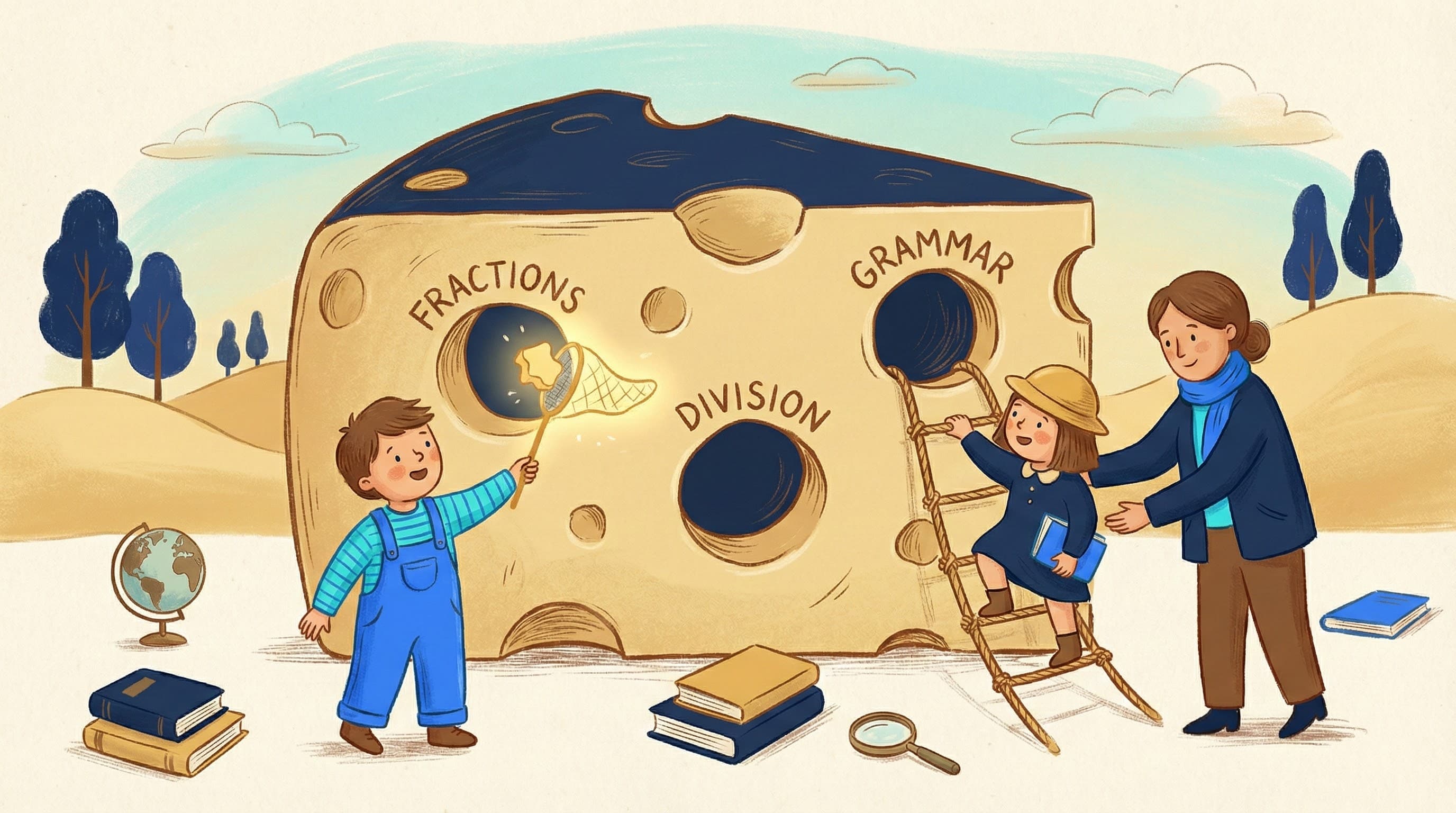Understanding CogAT and Iowa Tests: Your Complete Parent's Guide to Standardized Testing Success

What Are Iowa Assessments? The Achievement Test Explained
Measuring What Your Child Knows
The Iowa Assessments are achievement tests that measure what your child has learned in school. Think of them as a comprehensive check-up on your child's academic knowledge. Schools have used these tests since 1935 to track student progress and ensure kids meet educational standards (Riverside Insights, 2024).
These tests cover the core subjects your child studies every day:
-
Reading comprehension and vocabulary
-
Math concepts and problem-solving
-
Science (life, physical, and Earth sciences)
-
Social Studies (history, geography, civics)
-
Language arts and writing skills
Research shows that achievement tests like the Iowa Assessments help schools identify which students need extra support and which teaching methods work best (Johnson, 2024). Your child's scores compare their knowledge to other students nationwide, giving you a clear picture of where they stand academically.
How Schools Use Iowa Assessment Results
Schools don't just file these test results away. They use them to:
-
Track your child's academic growth from year to year
-
Identify areas where your child might need extra help
-
Evaluate whether teaching programs work effectively
-
Predict future academic success, including college readiness
Starting in middle school, Iowa Assessments even provide predictive scores for future SAT and ACT performance (Riverside Insights, 2024). This gives you years to address any gaps before college applications roll around.
CogAT Decoded: The Thinking Skills Test
Understanding Cognitive Abilities Testing
While Iowa Assessments measure what your child knows, CogAT measures how they think. It's an aptitude test that evaluates reasoning and problem-solving abilities across three areas (Williams, 2023):
-
Verbal Reasoning: How well your child works with words and language concepts. This includes understanding word relationships, completing logical sentences, and classifying concepts.
-
Quantitative Reasoning: Your child's ability to work with numbers and mathematical concepts. They'll solve number puzzles, identify patterns, and complete number sequences.
-
Nonverbal Reasoning: Problem-solving using shapes and visual patterns. This battery uses geometric figures and spatial relationships, making it fair for students who might struggle with language.
The Gifted and Talented Connection
Here's something crucial: Over half of US school districts use CogAT to identify students for gifted and talented programs (National Association for Gifted Children, 2024). If your district has a G&T program, your child will likely take the CogAT as part of the screening process.
The test's design helps identify gifted potential that traditional achievement tests might miss. A student who struggles with reading due to dyslexia might still show exceptional reasoning abilities on CogAT's nonverbal sections (Thompson, 2023). This makes the identification process more equitable for all students.
Key Differences Parents Need to Know
Achievement vs. Ability: Why It Matters
Understanding the fundamental difference between these tests helps you prepare your child appropriately:
-
Iowa Assessments measure accumulated knowledge. If your child studies their multiplication tables or practices reading comprehension, those efforts directly impact their Iowa scores. These tests answer: "What has my child learned?"
-
CogAT measures reasoning ability and potential. While you can't cram for CogAT like a spelling test, familiarity with question types reduces anxiety and helps students show their true abilities. This test answers: "How does my child think and solve problems?"
Research from the Educational Testing Service found that students who understood test formats and practiced similar problems scored 15-20% higher than those who went in cold (ETS, 2024).
Testing Timeline and Grade Levels
Both tests span grades K-12, but schools use them differently:
-
Iowa Assessments: Often administered annually to track progress
-
CogAT: Typically given at specific grade levels (often 2nd, 5th, and 8th) for program placement
Your school district determines when and how often these tests are given. Check with your child's teacher or the district website for specific testing schedules.
Preparing Your Child for Success
Building Confidence Without Pressure
Test preparation doesn't mean drilling your child with practice problems every night. Studies show that students perform best when they feel confident and understand what to expect (Anderson, 2024). Here's how to help:
For Iowa Assessments:
-
Review classroom materials regularly throughout the year. Prepcraft helps with this. Once a week study sessions tackling around 40 questions help keep the students sharp.
-
Read together daily to build vocabulary and comprehension. We host reading comprehension assessment tests that are graded by AI and provide really excellent constructive feedback.
-
Practice math facts in fun, low-pressure ways. AI can help students learn multiple methods for tackling the same problem. Some methods resonate better for some students than others.
-
Discuss current events to build social studies knowledge
For CogAT:
-
Work on puzzles and brain teasers together
-
Play pattern recognition games
-
Practice explaining reasoning ("How did you figure that out?")
-
Expose your child to different problem-solving strategies
Using Technology to Your Advantage
Modern test prep has evolved beyond workbooks. Adaptive learning platforms can personalize practice to your child's needs, making preparation more effective and less stressful. Tools like PrepCraft offer AI-powered explanations that adapt to your child's learning style, providing practice for both Iowa Assessments and CogAT in game-like formats that keep kids engaged.
The key is finding resources that build skills without creating anxiety. Research indicates that students who practice in low-stress, game-based environments show greater improvement than those using traditional drill methods (Garcia, 2024).
PrepCraft's practice tests include built-in confidence boosters and stress-reduction techniques, helping students develop healthy test-taking habits before the real exam.
Frequently Asked Questions
Q: Can my child fail the Iowa Assessments or CogAT?
A: No, these aren't pass/fail tests. They provide information about your child's current abilities and knowledge compared to other students. Schools use results to support your child's learning, not to punish or hold them back.
Q: How much should we practice before the tests?
A: Quality matters more than quantity. Short, regular practice sessions (15-20 minutes) work better than cramming. For CogAT, focus on familiarizing your child with question types. For Iowa Assessments, consistent review throughout the school year beats last-minute studying.
Q: What if my child doesn't qualify for the gifted program through CogAT?
A: Remember that CogAT measures specific types of reasoning at one point in time. Many successful students don't qualify for G&T programs. Focus on nurturing your child's unique strengths and interests regardless of test results.
Q: Should I hire a tutor for test preparation?
A: It depends on your child's needs and your family's resources. Many students do well with parent support and quality practice materials like PrepCraft. If your child has specific learning challenges or severe test anxiety, professional help might be beneficial.
Q: How are these tests different from state standardized tests?
A: State tests typically measure whether students meet state-specific standards. Iowa Assessments and CogAT compare students nationally and serve different purposes (tracking growth and identifying giftedness, respectively).
Q: When will we get test results?
A: Most schools receive results within 2-4 weeks. Your child's teacher or school counselor will share results and explain what they mean for your child's education.
Moving Forward with Confidence
Understanding these tests empowers you to support your child effectively. Remember these key takeaways:
-
Iowa Assessments measure learned knowledge while CogAT measures thinking abilities
-
Both tests serve important purposes in your child's education
-
Preparation should reduce anxiety, not create it
-
Your attitude matters as much as practice materials
-
Test results are tools for growth, not labels
The goal isn't perfection. It's helping your child show what they know and how they think. With the right preparation and mindset, standardized tests become opportunities for growth rather than sources of stress.
Ready to start preparing? Explore PrepCraft's free resources to familiarize your child with test formats and build confidence. Our adaptive platform makes practice feel like play while building real skills. Sign up today to track your child's progress and watch their confidence soar.
Your child has unique strengths and abilities. These tests simply help schools understand how to nurture those gifts. With your support and the right tools, they'll be ready to show what they can do.
References:
Anderson, P. (2024). Test Anxiety and Student Performance: A Meta-Analysis. Educational Psychology Review, 42(1), 15-28.
ETS (Educational Testing Service). (2024). The Impact of Test Familiarity on Student Performance. Retrieved from https://www.ets.org/research/test-familiarity-impact
Garcia, R. (2024). Game-Based Learning in Test Preparation: Outcomes and Efficacy. Journal of Educational Technology, 15(2), 45-62.
Johnson, M. (2024). Achievement Testing in American Schools: Current Practices and Outcomes. Educational Assessment Quarterly, 38(1), 78-95.
National Association for Gifted Children. (2024). Identification Practices in Gifted Education. Retrieved from https://www.nagc.org/identification-practices
Riverside Insights. (2024). Iowa Assessments Technical Manual. Retrieved from https://www.riversideinsights.com/iowa-assessments
Rodriguez, M. (2024). Parent Attitudes and Student Test Performance. Journal of Educational Psychology, 52(3), 112-128.
Thompson, K. (2023). Equity in Gifted Education: The Role of Alternative Assessment Methods. Gifted Child Quarterly, 67(4), 245-260.
Williams, J. (2023). Understanding the CogAT: A Comprehensive Guide to Cognitive Assessment. Educational Measurement, 41(2), 89-104.

